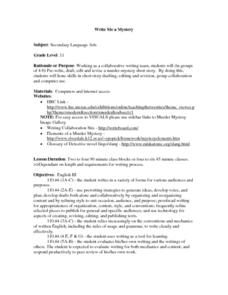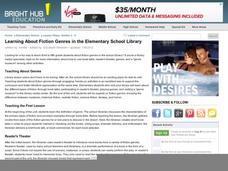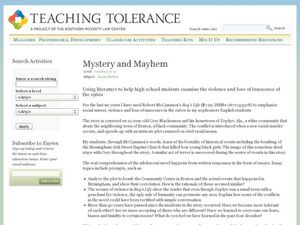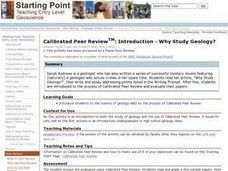Curated OER
History/Mystery: Regionalism and Ethnicity in the American Detective Novel
Learners use mystery novels to focus on the history and ethnicity of different regions of the United States. As a class, they are introduced to the elements of a mystery and compare them to the other types of novels they have read. In...
National Endowment for the Humanities
Faulkner's As I Lay Dying: Concluding the Novel
As I Lay Dying is a beautiful book and a wonderful vehicle for understanding, interpreting, and comparing themes. The class reads and analyzes the novel, discusses possible interpretations, and characterizations. They compare the themes...
Curated OER
Solve a Mystery
Fourth graders use text clues to solve mysteries. In this text clue/mystery solving instructional activity, 4th graders access a teacher assigned web site, Cyberkids.com, where they solve a mystery. They read chapters of, Encyclopedia...
Curated OER
Identifying Clues to Help Solve a Mystery
Students investigate clues in mystery novels. In this genre study lesson, students read the book Sammy Keyes and The Hotel Thief and use the 5 W's to answer questions about the mystery. Students draw conclusions using the details from...
Curated OER
Lesson 3: Identifying Clues to Help Solve a Mystery
In this reading comprehension lesson, 6th graders read the novel, The Westing Game, by Ellen Raskin. Students practice exploring the process of drawing conclusions from details to solve a mystery. Students interact with a Clue Tracker...
Curated OER
Mysterious Plot Problems
Your readers explore plot patterns in mysteries by identifying problems first in Two-Minute Mysteries by Donald J. Sobol and then in The Westing Game by Ellen Raskin. To gain access to the worksheets, graphic organizers and riddles...
Curated OER
Web Quest on "How to Write a Mystery."
Students complete a Web Quest on How to Write a Mystery. They listen to or read a short mystery story and discuss its elements. They write an outline of a mystery story using all of the elements.
Curated OER
Write Me a Mystery
Eleventh graders, in groups, pre-write, draft, edit and revise a murder mystery short story to hone their skills in short story drafting, editing and revision, group collaboration and computer usage. They also evaluate writing for both...
Curated OER
Art Mystery
Students explore famous artists in order to write mystery stories incorporating their life and works. They write their own based on their research of a particular artist.
Curated OER
Regarding the Fountain: Questioning Strategy—Cubing
Look deeper into the text with a reading strategy based on asking critical thinking questions. While reading Reading the Fountain by Kate Klise, learners think of questions that help them describe, compare, associate, analyze, apply, and...
Curated OER
Map the Mystery!
Seventh graders read the novel, "The House of Dies Drear", and create a story map to analyze the plot and recall events.
Curated OER
Predicting a Mystery's Solution
Who killed Sam Westing? Model for your class members the components of a good prediction, and how to use these components to predict a mystery's solution. Class members use what they have learned to craft predictions while reading Ellen...
Curated OER
A Little Mystery and Intrigue in Writing Short Detective Stories
Students read and analyze the twelve short stories in the novel "The Adventures of Sherlock Holmes." They create their own detective that has to solve a new kind of crime, and write and edit a short story with their original detective as...
Curated OER
Language Arts: Chasing Vermeer - A DaVinci Code for Children
Students read the mystery novel, Chasing Vermeer, research the artist and his works. Through observation of his works, they create their own pencil sketches of selected paintings. Finally, students simulate Vermeer's interiors with...
National Endowment for the Humanities
Tales of the Supernatural
Scary stuff! Whether approached as the first horror story or a "serious imaginative exploration of the human condition," Frankenstein continues to engage readers. Here's a packet of activities that uses Mary Shelley's gothic novel to...
Curated OER
Learning About Fiction Genres in the Elementary School Library
Teaching about fiction genres can be challenging. The lesson here, designed for library media specialists, offers a fun way to do it. In the lesson, learners visit the library and learn about the different types of fiction through book...
Avi Writer
The Cross of Lead, At the Edge of the World, and The End of Time
A fan of Ari's Crispin trilogy? Here is a packet that contains study guides for all three Crispin novels: The Cross of Lead, At the Edge of the World, and The End of Time.
Curated OER
Writing a Mystery Story
Students examine the elements of mystery stories and read Rage in Harlem. In reciprocal teaching groups, they discuss the author's development of the story, and complete dialectical journals.
Curated OER
Buried in Ice: The Mystery of a Lost Arctic Expedition
Students read a novel about a lost arctic expedition by Sir John Franklin. In groups, they discuss the author's quest to determine what happened to Franklin and his crew. Using the internet, they compare and contrast the expeditions by...
Curated OER
Mystery and Mayhem
Young scholars use literature to examine the violence and loss of innocence during the 1960s. In this U.S. history lesson, students read Robert McCammon's Boy's Life to investigate the social unrest, violence and loss of innocence in the...
EngageNY
Grade 9 ELA Module 1, Unit 2, Lesson 7
Readers analyze David Mitchell's techniques for introducing and developing the mystery surrounding Madame Crommelynck in the "Solarium" chapter of his novel Black Swan Green.
Curated OER
Calibrated Peer Review: Introduction-Why Study Geology?
Pupils read an article written by Sarah Andrews, a geologist who has written mystery novels featuring a geologist who solves crimes. After reading the article, students write an essay based on a Writing Prompt and begin peer review once...
Curated OER
"Split" Character Studies in Crime and Punishment
Students write an essay evaluating split character traits on major characters in Dostoevsky's novel Crime and Punishment. In this lesson students are guided through discussion questions, group assignments, and vocabulary work. The lesson...
Curated OER
Mystery of the Real Robinson Crusoe Solved
Learners explore the location of the campsite of fictional character Robinson Crusoe. In this ESL lesson, students read an article that discusses the whereabouts of Robinson Crusoe's campsite, then have a class discussion on the...

























